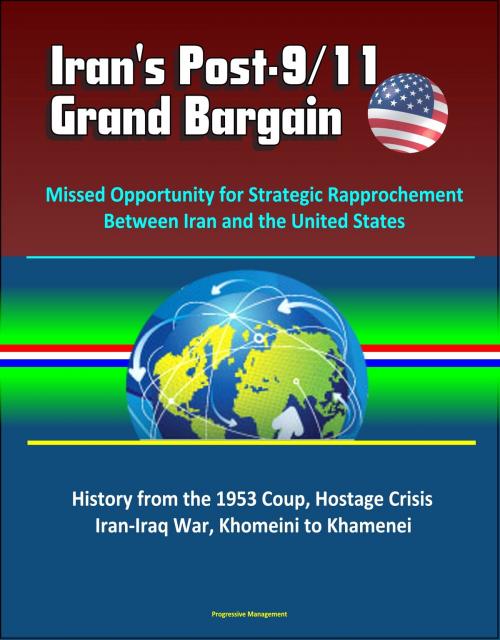Iran's Post-9/11 Grand Bargain: Missed Opportunity for Strategic Rapprochement Between Iran and the United States - History from the 1953 Coup, Hostage Crisis, Iran-Iraq War, Khomeini to Khamenei
Nonfiction, History, Middle East, Military| Author: | Progressive Management | ISBN: | 9781310999987 |
| Publisher: | Progressive Management | Publication: | July 3, 2016 |
| Imprint: | Smashwords Edition | Language: | English |
| Author: | Progressive Management |
| ISBN: | 9781310999987 |
| Publisher: | Progressive Management |
| Publication: | July 3, 2016 |
| Imprint: | Smashwords Edition |
| Language: | English |
This excellent report has been professionally converted for accurate flowing-text e-book format reproduction. An examination of the historical context of U.S.-Iran relations since 1953, the three efforts at rapprochement since 1979, and the unprecedented nature of U.S.-Iran dialogue and cooperation after 9/11, will demonstrate how the Bush administration missed an unprecedented opportunity for rapprochement with Iran between 2001 and 2003. Part one begins with a history of Iran and a review of U.S.-Iran relations during the twentieth-century, particularly the last 60 years, in order to generate the proper context. This section concludes with an analysis of Iran's 1979 Islamic revolution and subsequent U.S. Embassy takeover in order to demonstrate the opposing perspectives through which each side viewed the other during this tumultuous period. Ultimately, mutual misinterpretations of the events of 1953 and 1979 conspired to plague U.S.-Iran relations for the next three decades.
Part two examines U.S.-Iran relations from 1980 to 2000, particularly the efforts by each successive American administration to develop Iran policy and improve relations. From President Reagan's weapons for hostages scheme and President George H.W. Bush's Picco channel with Iranian President Ali Rafsanjani, to President Clinton's dual containment strategy and track-two diplomacy with Iranian President Mohammad Khatami, each effort failed primarily as a result of the lack of formal diplomatic relations. This period in U.S.-Iran relations served to demonstrate how unfamiliarity breeds contempt and distrust. For America, Iran was not a priority, and the lack of a comprehensive Iran policy only complicated matters. This section concludes with an analysis of internal Iranian politics at the turn of the century. The election of Iranian President Khatami in 1997 presented the best opportunity yet to engage Iran, but as demonstrated, this approach needed more common ground and diplomatic patience in order to succeed.
Part three focuses exclusively on the period from 2001-2003, and examines the complicated nature of Iranian cooperation with the United States after 9/11. The George W. Bush administration, without a coherent Iran policy, initially cooperated with Iran. Multilateral discussions on Afghanistan in 2001 quickly expanded into bilateral discussions and cooperation in Afghanistan and Iraq. With a post-9/11 surplus of political capital, the administration, after the successful campaign in Afghanistan and with an eye towards Iraq, began to rely on a one size fits all pre-emptive foreign policy prescribed by the new Bush Doctrine. Despite the progress of political reform in Iran, unprecedented cooperation on Afghanistan, and unconditional offers to resume normal diplomatic relations, neoconservatives within the White House and Department of Defense hijacked the foreign policy process and pursued a short-sighted policy of Iranian regime change at all cost. The administration ultimately chose to end the bilateral dialogue with Iran, and ignored its offer of a grand bargain proposal to settle differences and resume diplomatic relations. This policy decision was at best based on the same errors of mutual misunderstanding and policy miscalculation that have plagued the relationship between the United States and Iran since 1953, and was at worst a victim of policy neglect and hubris after tactical military victory in Afghanistan and Iraq.
Iran and the Great Game * Constitutional Democracy * World War II and the Cold War: A New Shah * The 1953 Coup * The Pahlavi Era * Seeds of Discontent * Revolution * America: Lost in the Revolution * 444 Days * Downfall of the Moderates * EARLY EFFORTS AT RAPPROCHEMENT * The Iran-Iraq War * 1982: Israel Invades Lebanon * Weapons for Hostages * The Persian Gulf Tanker War * Reagan: Analysis * From Khomeini to Khamenei * Bush Policy: The Picco Channel * Bush: Analysis
This excellent report has been professionally converted for accurate flowing-text e-book format reproduction. An examination of the historical context of U.S.-Iran relations since 1953, the three efforts at rapprochement since 1979, and the unprecedented nature of U.S.-Iran dialogue and cooperation after 9/11, will demonstrate how the Bush administration missed an unprecedented opportunity for rapprochement with Iran between 2001 and 2003. Part one begins with a history of Iran and a review of U.S.-Iran relations during the twentieth-century, particularly the last 60 years, in order to generate the proper context. This section concludes with an analysis of Iran's 1979 Islamic revolution and subsequent U.S. Embassy takeover in order to demonstrate the opposing perspectives through which each side viewed the other during this tumultuous period. Ultimately, mutual misinterpretations of the events of 1953 and 1979 conspired to plague U.S.-Iran relations for the next three decades.
Part two examines U.S.-Iran relations from 1980 to 2000, particularly the efforts by each successive American administration to develop Iran policy and improve relations. From President Reagan's weapons for hostages scheme and President George H.W. Bush's Picco channel with Iranian President Ali Rafsanjani, to President Clinton's dual containment strategy and track-two diplomacy with Iranian President Mohammad Khatami, each effort failed primarily as a result of the lack of formal diplomatic relations. This period in U.S.-Iran relations served to demonstrate how unfamiliarity breeds contempt and distrust. For America, Iran was not a priority, and the lack of a comprehensive Iran policy only complicated matters. This section concludes with an analysis of internal Iranian politics at the turn of the century. The election of Iranian President Khatami in 1997 presented the best opportunity yet to engage Iran, but as demonstrated, this approach needed more common ground and diplomatic patience in order to succeed.
Part three focuses exclusively on the period from 2001-2003, and examines the complicated nature of Iranian cooperation with the United States after 9/11. The George W. Bush administration, without a coherent Iran policy, initially cooperated with Iran. Multilateral discussions on Afghanistan in 2001 quickly expanded into bilateral discussions and cooperation in Afghanistan and Iraq. With a post-9/11 surplus of political capital, the administration, after the successful campaign in Afghanistan and with an eye towards Iraq, began to rely on a one size fits all pre-emptive foreign policy prescribed by the new Bush Doctrine. Despite the progress of political reform in Iran, unprecedented cooperation on Afghanistan, and unconditional offers to resume normal diplomatic relations, neoconservatives within the White House and Department of Defense hijacked the foreign policy process and pursued a short-sighted policy of Iranian regime change at all cost. The administration ultimately chose to end the bilateral dialogue with Iran, and ignored its offer of a grand bargain proposal to settle differences and resume diplomatic relations. This policy decision was at best based on the same errors of mutual misunderstanding and policy miscalculation that have plagued the relationship between the United States and Iran since 1953, and was at worst a victim of policy neglect and hubris after tactical military victory in Afghanistan and Iraq.
Iran and the Great Game * Constitutional Democracy * World War II and the Cold War: A New Shah * The 1953 Coup * The Pahlavi Era * Seeds of Discontent * Revolution * America: Lost in the Revolution * 444 Days * Downfall of the Moderates * EARLY EFFORTS AT RAPPROCHEMENT * The Iran-Iraq War * 1982: Israel Invades Lebanon * Weapons for Hostages * The Persian Gulf Tanker War * Reagan: Analysis * From Khomeini to Khamenei * Bush Policy: The Picco Channel * Bush: Analysis















